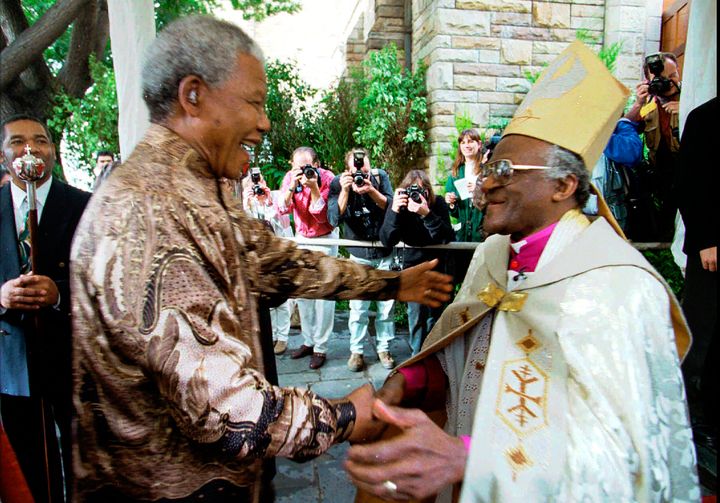
World leaders and human rights activists on Sunday mourned the death of Desmond Tutu, the South African priest and human rights activist who won a Nobel Peace Prize for his work fighting apartheid, racial injustice and homophobia.
Tutu died peacefully at the age of 90 in Cape Town, South African President Cyril Ramaphosa announced. Ramaphosa said in a statement that the activist’s death “is another chapter of bereavement in our nation’s farewell to a generation of outstanding South Africans who have bequeathed us a liberated South Africa.”
Advertisement
“From the pavements of resistance in South Africa to the pulpits of the world’s great cathedrals and places of worship, and the prestigious setting of the Nobel Peace Prize ceremony, the Arch distinguished himself as a non-sectarian, inclusive champion of universal human rights,” Ramaphosa continued.
Tutu’s daughter, Naomi Tutu, said that her father is “at rest.”
“Thank you Tshezi for all you have been to our family and the world,” she said on Twitter. “Lala ngo xolo Desmond Mpilo Tutu.”
Tutu was ordained in 1961 and eventually became bishop of the small southern African kingdom of Lesotho, chairman of the South African Council of Churches, the first Black Anglican bishop of Johannesburg, and the first Black Anglican bishop of Cape Town.
Advertisement
Pope Francis said he was saddened to learn of Tutu’s death, and invoked “the divine blessings of peace and consolation of the Lord” upon all who mourned the former priest’s passing. The pope also paid tribute to Tutu’s religious service through the “promotion of racial equality and reconciliation in his native South Africa.”

Guy Tillim via Associated Press
Throughout the 1980s, Tutu was one of the most prominent Black South Africans speaking out against the country’s abuses, such as apartheid violence and a state of emergency that gave police and the military overwhelming power. He won the 1984 Nobel Peace Prize for his work.
Tutu often worked with fellow Nobel laureate and anti-apartheid activist Nelson Mandela, who, after 27 years in prison during white rule, became South Africa’s first president in 1994. As president, Mandela appointed Tutu to be chairman of the Truth and Reconciliation Commission, which revealed the abuses of the apartheid system. He was also vocal about the occupation of Palestine, accusing Israel of being guilty of apartheid.
“Archbishop Desmond Tutu’s life was a gift. Blessed with brilliance and eloquence, steady determination and good humor, and an unshakeable faith in the inherent decency of all people, Archbishop Tutu fully embodied the spirit of Ubuntu: ‘I am because you are,’” said Bill Clinton, who was president of the U.S. when South Africa was liberated from apartheid. “That spirit drove him to fight first for freedom and then for reconciliation.
Advertisement
“As Chairman of the Truth and Reconciliation Commission, he helped bring healing to his country and reminded us all that the search for justice begins in the heart. His own heart was good enough to seek reconciliation not revenge, to reject demonization and embrace his uncanny ability to bring out the best in others,” Clinton continued. “Those of us touched by the gift of his life owe it to him to pass it on.”
As a religious leader, Tutu also campaigned internationally for LGBTQ rights and same-sex marriage. The former priest said he would not “worship a God who is homophobic” and in 2013 launched a campaign in Cape Town for LBGTQ rights. His stance was controversial with many in his home country and in the Anglican church.
Victor Madrigal-Borloz, the United Nations’ independent expert on LGBTQ rights, remembered Tutu’s activism in a tweet on Sunday: “I am grateful for a life packed with so much dignity, so much wisdom and so much love for his siblings,” he said. “I am in debt for a life of such vital support for the struggle against violence and discrimination based on” sexual orientation and gender identity.
A number of other leaders and humanitarian figures paid tribute to Tutu and his legacy:
Related posts:
Views: 0
 RSS Feed
RSS Feed

















 December 27th, 2021
December 27th, 2021  Awake Goy
Awake Goy  Posted in
Posted in  Tags:
Tags: 
















